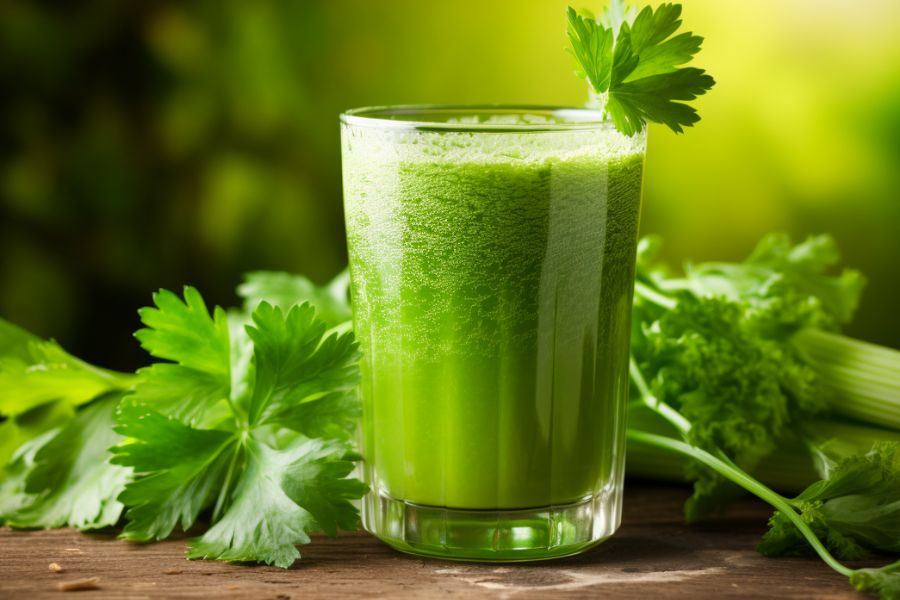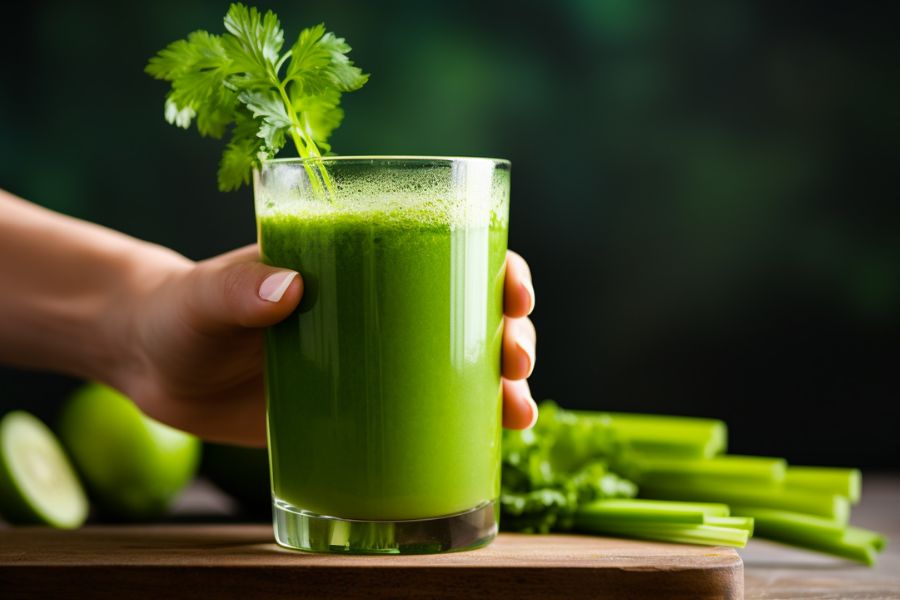Benefits of Celery Juice for IBS
Struggling with Irritable Bowel Syndrome (IBS) can often feel like you’re waging a war against your own body. Did you know that celery juice, rich in antioxidants and anti-inflammatory compounds, offers several potential benefits to improve gut health? This article intends to walk you through the scientific research behind these benefits, while debunking common misconceptions about this green elixir.

So why wait? Let’s dive into the world of celery juice for a healthier digestive system!
Key Takeaways
- Celery juice offers several benefits for individuals with IBS and digestive health, including its anti-inflammatory properties, hydrating effects, low sugar content, and beneficial plant compounds.
- The anti-inflammatory properties of celery juice can help reduce inflammation in the gut and provide relief from symptoms associated with conditions like IBS.
- The hydrating effects of celery juice can help maintain proper hydration levels in the body, support digestion, and promote overall gut health.
- Celery juice has a low sugar content compared to other fruit juices, making it a healthier choice for individuals with IBS or those following a low FODMAP diet.
The Science Behind Celery Juice for IBS and Digestive Health
Celery juice offers several scientific benefits for individuals with IBS and digestive health, including its anti-inflammatory properties, hydrating effects, low sugar content, beneficial plant compounds, and fiber content in unstrained juice.
Anti-inflammatory properties
Celery juice boasts notable anti-inflammatory properties that serve as a boon for individuals grappling with irritable bowel syndrome (IBS) and other digestive health issues. These anti-inflammatory benefits can be attributed to the abundance of phytonutrients present in celery, like flavonoids, tannins, and phenolic acids.
Flavonoids, specifically, help combat oxidative stress – one of the key contributors to inflammation within the body. Moreover, celery’s alkaline nature aids in balancing pH levels in our bodies, further reducing acidity-induced inflammation.
Thus, these properties make celery juice an effective natural remedy against inflammatory digestive conditions such as IBS.
Hydrating effects
Celery juice is packed with essential nutrients and offers hydrating effects that can benefit those with IBS and digestive health issues. As celery contains a high water content of up to 95%, drinking celery juice can help maintain proper hydration levels in the body.
Staying hydrated is crucial for optimal digestion as it helps soften stools, prevent constipation, and promote overall gut health. Additionally, adequate hydration aids in the absorption of nutrients from food and supports the smooth functioning of the digestive system.
Including celery juice in your daily routine can provide an effortless way to keep your body hydrated while enjoying its numerous other benefits.
Low sugar content
Celery juice is refreshing and a great choice for those concerned about their sugar intake. Unlike many fruit juices that are high in natural sugars, celery juice has a low sugar content, making it a healthier option for individuals with IBS and digestive health issues.
This is especially important for those following a low FODMAP diet, which restricts certain types of carbohydrates that can trigger symptoms. By choosing celery juice, you can enjoy the benefits of improved gut function and relief from common IBS symptoms without worrying about consuming excessive amounts of sugar.
Plus, the low sugar content makes celery juice a nutritionally balanced beverage to include as part of your daily routine. So go ahead and sip on some celery goodness, knowing that you’re making smart choices for your digestive health!

Beneficial plant compounds
Celery juice is packed with beneficial plant compounds that can greatly benefit individuals with IBS and digestive health issues. These compounds, including antioxidants and anti-inflammatory agents, play a crucial role in reducing inflammation, promoting gut health, and supporting overall digestive function.
The high concentration of these plant-based nutrients found in celery juice makes it an excellent addition to a healthy diet for those seeking natural remedies for their digestive ailments. Additionally, celery juice contains fiber, vitamins C, A, K, potassium, and folate, which further contribute to its positive impact on digestion.
By incorporating celery juice into your daily routine, you can tap into the power of these beneficial plant compounds, and experience improved digestive health.
Fiber content in unstrained juice
Celery juice, particularly when left unstrained, contains significant fiber. This is because the pulp and skin of the celery stalks are included in the juicing process. Fiber plays a crucial role in promoting healthy digestion by adding bulk to the stool and facilitating regular bowel movements.
It can also help regulate blood sugar levels and keep you feeling fuller for longer. Additionally, fiber acts as a prebiotic, providing nourishment for beneficial bacteria in the gut, which is essential for maintaining a healthy digestive system.
Incorporating celery juice with its natural fiber content into your daily routine can be an excellent way to support your digestive health. Just remember that if you prefer strained juice or opt for store-bought celery juices that have been filtered, their fiber content may be significantly reduced compared to unstrained versions.
Considerations for IBS Management
Celery juice may be a potential trigger for some individuals with IBS, and it’s important to be mindful of false claims surrounding celery juice cleanses. Additionally, the sodium content in celery juice should be taken into consideration, along with its lower fiber content compared to consuming whole celery stalks.
Celery juice as a potential trigger for some individuals
While celery juice has gained popularity for its potential benefits for digestive health and IBS symptoms, it’s important to note that it can also be a trigger for some individuals. Drinking celery juice may cause discomfort and worsen symptoms in those who are sensitive or intolerant to certain compounds found in celery.
It’s crucial to listen to your body and pay attention to any adverse reactions or changes in symptoms after consuming celery juice. Consulting with a healthcare professional can provide personalized advice on whether incorporating celery juice into your diet is suitable for you.

False claims about celery juice cleanse
Celery juice has gained popularity as a healing elixir, with some claiming it can cleanse the body and cure various illnesses, including IBS. However, being cautious of false claims surrounding celery juice cleanses is important.
While drinking celery juice can offer certain health benefits, it is not a magical solution to all digestive issues. There is limited scientific evidence supporting the detoxifying effects of celery juice on the body.
It’s crucial to consider other factors that contribute to overall digestive health, such as maintaining a balanced diet and lifestyle choices. Always consult with healthcare professionals for personalized advice regarding your specific condition or concerns related to IBS and digestive health management.
Sodium content in celery juice
Celery juice is often touted for its numerous health benefits, but it’s important to be mindful of its sodium content. While celery itself is a low-sodium vegetable, juicing multiple stalks of celery can increase the sodium levels in the resulting juice.
This is because juicing concentrates the nutrients and natural salts found in the vegetable. However, celery juice remains a relatively low-sodium option compared to other commercially available beverages and processed foods.
It’s essential for individuals with high blood pressure or those on a restricted sodium diet to monitor their intake of celery juice and consult with their healthcare professional for personalized advice.
Low fiber content
Although touted for its numerous health benefits, Celery juice is relatively low in fiber content. While some individuals may see this as a downside, especially for those looking to improve their digestive health, it’s important to consider the overall context of incorporating celery juice into a balanced diet.
Although low in fiber compared to other fruits and vegetables, celery still contains essential nutrients that can support gut health. The high water content and natural electrolytes found in celery juice can help promote hydration and maintain proper digestion.
Additionally, consuming celery juice as part of a nutritionally balanced meal plan that includes other sources of fiber can ensure adequate intake.
While it’s true that fiber plays a crucial role in maintaining regular bowel movements and supporting overall gut function, the unique combination of antioxidants and anti-inflammatory compounds found in celery can still provide notable benefits for those with IBS or digestive issues.
It’s important to consult with a healthcare professional or registered dietitian to ensure dietary needs are met when incorporating celery juice into an IBS management plan.
Benefits of Celery Juice for Digestive Health
Celery juice improves gut function, alleviates IBS symptoms, and may reduce inflammation in the digestive system. Discover how this powerful natural remedy can benefit your digestive health.
Improved gut function
Celery juice has been praised for its ability to improve gut function. It contains essential nutrients like fiber, potassium, and vitamins C, A, K, and folate, promoting a healthy digestive system.
The high fiber content in celery juice helps support regular bowel movements and prevent constipation. Additionally, the antioxidants found in celery juice can help reduce inflammation in the gut, which is particularly beneficial for individuals with conditions like IBS or Crohn’s disease.
By incorporating celery juice into your daily routine, you can potentially experience improved digestion and overall gut health.
Alleviation of IBS symptoms
Drinking celery juice can alleviate Irritable Bowel Syndrome (IBS) symptoms. Celery juice, with its anti-inflammatory properties and natural laxative effects, may help to soothe an unhealthy digestive system.
The antioxidants found in celery can also contribute to reducing inflammation in the gut, providing relief from IBS symptoms such as bloating and abdominal pain. Additionally, celery juice is known for aiding overall digestion by relaxing nerves and promoting a nutritionally balanced diet.
With its numerous benefits for digestive health, incorporating celery juice into your daily routine could be a valuable step towards managing IBS symptoms effectively.
Potential for reducing inflammation in the digestive system
Celery juice has shown promising potential in reducing inflammation in the digestive system. This is primarily due to its anti-inflammatory properties and the presence of beneficial plant compounds.
Inflammation in the digestive system can lead to discomfort, pain, and increased symptoms for individuals with conditions like IBS.
The antioxidants found in celery juice help fight against free radicals that contribute to inflammation. Additionally, celery juice contains phytonutrients such as apigenin and luteolin, which have been studied for their anti-inflammatory effects.
By incorporating celery juice into your diet, you may experience a reduction in overall inflammation within your digestive system.
How to Incorporate Celery Juice into a Healthy Diet
To incorporate celery juice into a healthy diet, start by making your own at home using fresh celery stalks and a juicer or blender.
Making celery juice at home
Making celery juice at home is a simple and cost-effective way to incorporate this beneficial beverage into your daily routine. Here’s how you can easily make celery juice in the comfort of your own kitchen:
- Start by selecting fresh, organic celery stalks. Organic celery is preferable as it reduces the risk of exposure to pesticides.
- Wash the celery stalks thoroughly to remove any dirt or impurities. Cut off the base and trim any brown or wilted parts.
- Chop the celery stalks into smaller pieces to make them easier to blend.
- Place the chopped celery into a high-powered blender or juicer. If using a blender, you may need to add a small amount of water to help with blending.
- Blend or juice the celery until it becomes a smooth, liquid consistency.
- Strain the juice through a fine mesh strainer or cheesecloth to remove any pulp or fiber. This step is optional; some people prefer to consume the juice with all its natural fiber intact.
- Pour the freshly made celery juice into a glass and enjoy immediately for maximum nutritional benefits.
- To maximize freshness and preserve nutrients, consuming the celery juice within 12-24 hours of making it is best.
Combining celery juice with other gut-friendly foods and beverages
Combining celery juice with other gut-friendly foods and beverages can further support digestive health and enhance the benefits of celery juice. Here are some ideas for incorporating celery juice into a nutritious diet:
- Pair celery juice with probiotic-rich foods like yoghurt or kefir to promote a healthy balance of gut bacteria.
- Add freshly squeezed lemon or lime juice to your celery juice for an extra boost of vitamin C and added flavor.
- Enjoy celery juice alongside fermented foods such as sauerkraut, kimchi, or kombucha to support gut health and digestion.
- Incorporate celery stalks into salads, soups, or stir-fries to get additional fiber while still benefiting from its digestive properties.
- Drink herbal teas like chamomile or ginger tea alongside celery juice for soothing effects on the digestive system.
- Experiment with adding small amounts of other nutrient-dense vegetables like cucumber, spinach, or parsley to your celery juice for a diverse range of vitamins and minerals.
Consulting with a healthcare professional for personalized advice
It is essential to consult with a healthcare professional for personalized advice when incorporating celery juice into your diet, especially if you have IBS or any digestive health concerns.
While celery juice can offer potential benefits, everyone’s body reacts differently to different foods and beverages. A healthcare professional will be able to assess your needs and guide you on whether celery juice suits you.
They can also help determine the appropriate amount of celery juice to consume and advise on any potential interactions with medications or other dietary considerations. Remember, seeking professional advice ensures that you are making informed decisions regarding your health and well-being.
Conclusion
In conclusion, celery juice offers several benefits for individuals with IBS and digestive health concerns. Its anti-inflammatory properties, hydration effects, low sugar content, and beneficial plant compounds make it a valuable addition to a healthy diet.
However, it’s important to consider individual sensitivities and consult a healthcare professional for personalized advice. Incorporating celery juice into a nutritionally balanced meal plan can potentially improve gut function, alleviate IBS symptoms, and reduce inflammation in the digestive system.
Remember to enjoy celery juice as part of an overall approach to maintaining good digestive health.
You might be interested in reading about celery juice and acid reflux and the power of celery juice for arthritis.
FAQs
1. How does celery juice benefit individuals with IBS and digestive health issues?
Celery juice has natural anti-inflammatory properties that can help soothe inflammation in the digestive tract, which is a common issue for those with IBS. It also contains fiber that aids in regulating bowel movements and promoting healthy digestion.
2. Can celery juice improve symptoms of bloating and gas associated with IBS?
Yes, celery juice can be beneficial for reducing bloating and gas caused by IBS. The high water content in celery helps hydrate the body and flush out toxins, while its natural enzymes aid in breaking down food more efficiently to prevent excess gas production.
3. How should I incorporate celery juice into my diet for maximum benefits?
To experience the benefits of celery juice, it is recommended to drink it fresh on an empty stomach every morning before consuming any other foods or beverages. This allows your body to absorb its nutrients fully without interference.
4. Are there any potential side effects or precautions when drinking celery juice for digestive health?
While most individuals tolerate celery juice well, some may experience increased bowel movements initially as the body adjusts to its detoxifying effects. It’s important to start with small amounts and gradually increase intake if needed. Additionally, those on blood thinners should consult their healthcare provider due to its vitamin K content which may interfere with medication effectiveness.
Resources
https://thefoodtreatmentclinic.com/is-celery-juice-good-for-ibs/
https://www.healthline.com/nutrition/celery-juice-cleanse
https://ignitenutrition.ca/blog/celery-juice-and-gut-health/
https://www.stylecraze.com/articles/benefits-of-celery-juice-for-skin-hair-and-health/
https://www.healthylife.com.au/learn/is-celery-low-fodmap-and-can-celery-juice-help-ibs
https://gethealthyu.com/amazing-health-benefits-of-celery-juice/
https://www.avera.org/balance/integrative-medicine/the-power-of-celery-juice/
